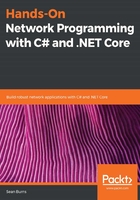
What is a network?
At its most basic, a network is nothing more than a physical implementation of an undirected graph; a series of nodes and edges, or connections, between those nodes, as demonstrated in the following diagram:

A basic, undirected graph
However, the preceding diagram doesn't quite capture the full picture. What constitutes a node, and what is sufficient for a connection are all very pertinent details to clarify. An individual node should probably be able to meaningfully interact with other nodes on the network, or else you might have to concern yourself with programming for a potato connected by two wires to a network of routers and servers. It's safe enough to say that potatoes very obviously aren't nodes, and that an active and stable Azure server very obviously is, so the line delineating nodes from non-nodes on a network falls somewhere between those two poles. Likewise, we can easily identify that the cables from the power supply of a computer to the outlet in a wall don't constitute a network connection, but that a CAT-5 cable from our computer to a router obviously does. The dividing line probably falls somewhere between those two, and it is important that we take care to draw that line accurately.
We'll start with a workable definition of networks for the purposes of this book, unpack the definition, and examine why we chose to make the specific distinctions we have, and finally, consider what each essential property of a network means to us as programmers. So, without further ado, the definition of a computer network is as follows:
A computer network is, for our purposes, an arbitrarily large set of computational or navigational devices, connected by channels of communication across which computational resources can be reliably sent, received, forwarded, or processed.
On the surface, that might seem basic, but there is a lot of nuance in that definition that deserves our consideration. So, let's take a deeper dive.